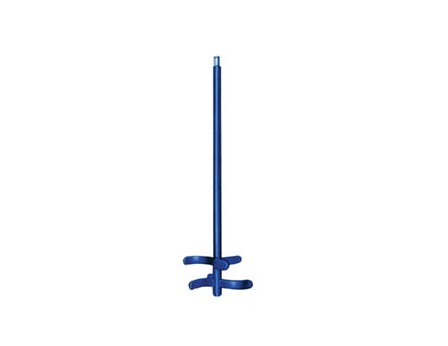In the fields of mixing, stirring, and homogenization, propeller vs impeller mixer are two common devices. They each have unique working principles, performance characteristics, and applicable scenarios. This article will provide a detailed introduction and comparative analysis of these two types of mixers.
1. Propeller mixer
Basic structure and working principle
As the name suggests, a propeller mixer has a spiral shaped stirring component. It is usually driven by an electric motor and drives the propeller to rotate through a reduction mechanism. During the rotation process, the blades of the propeller exert pushing and shearing effects on the material, thereby achieving a mixing effect.
1. Performance characteristics
High mixing efficiency: The rotation of the propeller can generate strong shear forces and eddies, allowing the material to mix quickly and evenly.
Wide applicability: Suitable for mixing materials with high viscosity, high concentration, and containing solid particles.
Simple structure: easy to maintain and clean, reducing usage costs.
2. Application scenarios
Propeller mixers are widely used in chemical, pharmaceutical, food, metallurgical and other fields. For example, in chemical production, it can be used to mix reaction materials; In the pharmaceutical industry, it can be used to prepare ointments, medicines, etc; In the food industry, it can be used to stir jams, seasonings, etc.

2. Impeller mixer
Basic structure and working principle
The
impeller mixer is mainly composed of a motor, an impeller, and a stirring shaft. The motor drives the mixing shaft to rotate, which in turn drives the impeller to rotate. During the rotation of the impeller, its blades produce stirring and shearing effects on the material, achieving the purpose of mixing the material.
1. Performance characteristics
High mixing uniformity: The high-speed rotation of the impeller can generate strong stirring effect, making the material highly uniform in a short time.
Low energy consumption: Compared to propeller mixers, impeller mixers have lower energy consumption under the same mixing effect.
Easy to operate: easy to control mixing speed and time, meeting different process requirements.
2. Application scenarios
The impeller mixer is also widely used in multiple fields. In the chemical industry, it can be used for mixing liquid raw materials; In the field of water treatment, it can be used for stirring and homogenizing aqueous solutions; In the food industry, it can be used to stir and mix various food ingredients.
Comparison and Analysis
1. Mixing efficiency and uniformity
The propeller mixer exhibits excellent mixing efficiency and uniformity, making it particularly suitable for mixing materials with high viscosity and concentration. The impeller mixer is better at mixing materials with low viscosity and low concentration, and the mixing uniformity is also higher.
2. Energy consumption and cost
In terms of energy consumption, impeller mixers are usually lower than propeller mixers. This means that in long-term use, the impeller mixer can save more energy costs. However, when selecting equipment, it is also necessary to consider factors such as the purchase cost, maintenance cost, and service life of the equipment comprehensively.
3. Applicable scenarios and flexibility
Propeller mixer and impeller mixer each have unique applicable scenarios. Propeller mixers are more suitable for processing high viscosity, high concentration materials, and mixtures containing solid particles; The impeller mixer is more suitable for mixing low viscosity, low concentration materials, and situations that require high homogenization. In terms of flexibility, both can be customized and adjusted according to actual needs to meet different process requirements.
Propeller mixer and impeller mixer are two common mixing devices, each with unique working principles, performance characteristics, and applicable scenarios. When selecting equipment, comprehensive consideration should be given to factors such as material properties, mixing requirements, and cost budget. By comparing and analyzing the performance characteristics and application scenarios of propeller mixer and impeller mixer, we can better understand the advantages and limitations of these two devices, and provide more reasonable equipment selection solutions for practical production.



 Address:Room 1202, Detaitang Building, No. 118 Huaguang Road, Zhangdian District, Zibo, Shandong
Address:Room 1202, Detaitang Building, No. 118 Huaguang Road, Zhangdian District, Zibo, Shandong WhatsApp:+8613386433135
WhatsApp:+8613386433135 Tel: +8613386433135
Tel: +8613386433135